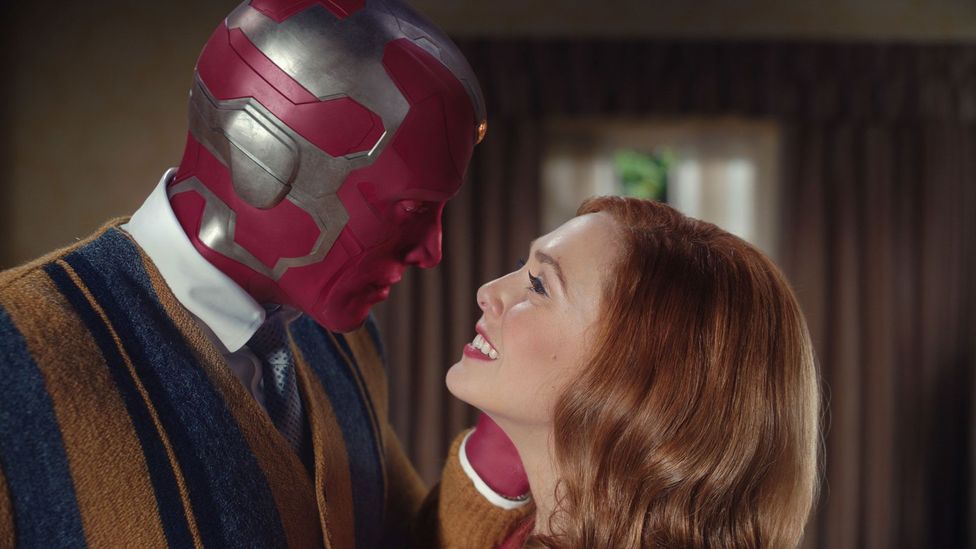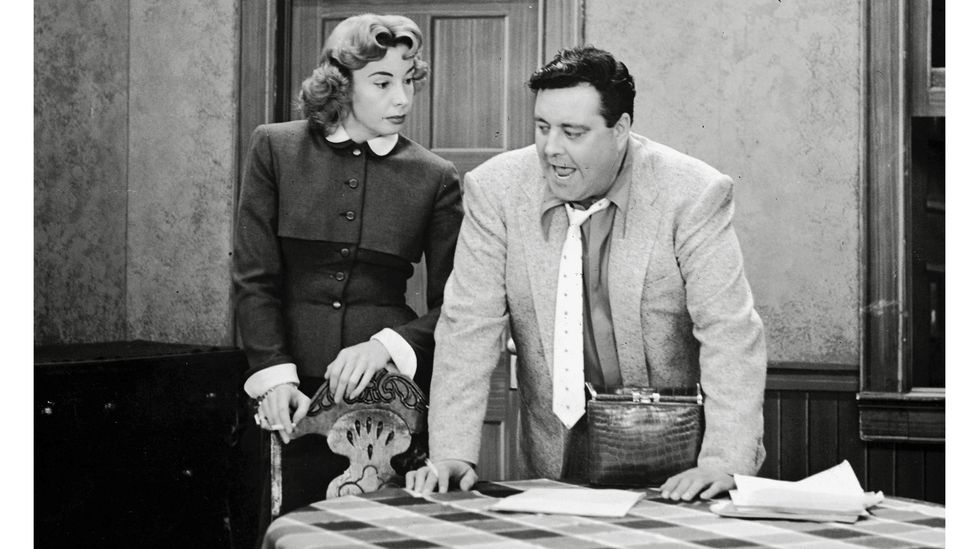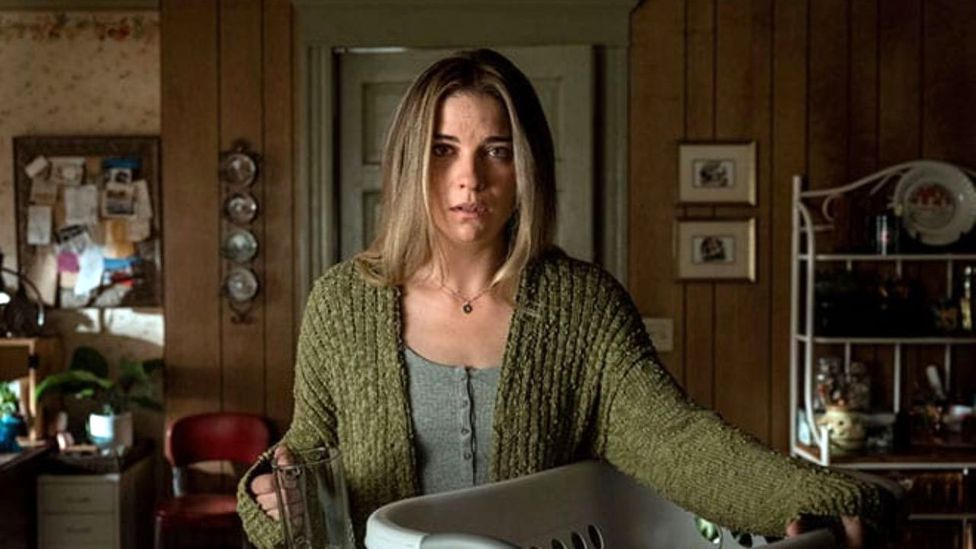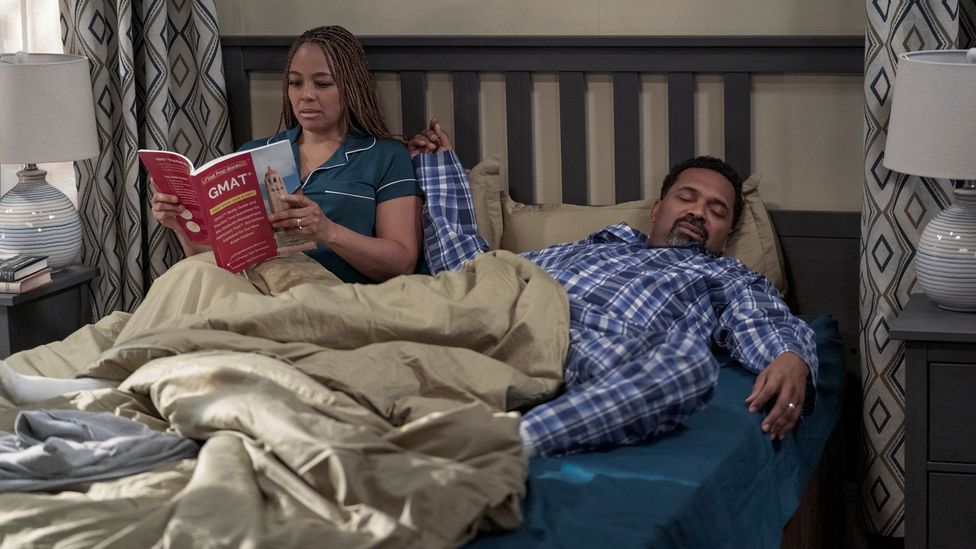At first glance, Kevin Can F*** Himself – as AMC is calling its new series, asterisks and all – seems to be a creaky old sitcom about an oafish husband, Kevin, and his smarter, put-upon wife, Allison (Annie Murphy of Schitt's Creek fame). But after the opening scene, this clever comedy-drama reveals its true, subversive nature.
More like this:
- Our verdict on the Friends reunion
- Loki is "dazzling and weird"
- The shows that reveal the real France
Allison walks from the living room, where Kevin has just tossed his empty beer mug into her laundry basket to the sound of canned laughter, into the kitchen. As the lighting darkens dramatically, Allison looks straight into the camera, and with a despondent look on her face, smashes the mug into pieces. From then on, Kevin Can... veers back and forth between traditional sitcom scenes of domestic misadventures with punchlines, and Allison's reality – where she has a boring job in a shop and fantasises about taking the broken handle of the mug and stabbing Kevin in the neck. The show is an expression of "feminist rage", its creator Valerie Armstrong tells BBC Culture, exposing how unhappy those decades of smiling sitcom wives must have been.
Like recent Marvel show WandaVision, with its spoofs of classic family comedies from the 1950s through to the 2010s, Kevin Can… comments on the strange persistence of the retro trope of the patient, subservient wife. While society has moved forward, the stereotype remains potent enough to be a target of satire, so firmly embedded in the culture that it is easily understood – even by younger audiences. WandaVision acknowledges the unreality of the television image, a fantasy that Wanda temporarily lives in, whereas Kevin Can… sets Allison on a course of revenge. In both series, it is satisfying to watch that image explode.

Both Kevin Can… and WandaVision comment on the strange persistence of the retro trope of the patient, subservient wife (Credit: Marvel Studios 2020)
But the trope is also used unironically in current series like the new Netflix comedy The Upshaws and CBS's ongoing The Neighbourhood, with doltish husbands and the wives who alternately nag and humour them. These straightforward shows suggest that society – which TV so often reflects – is far from accepting fundamental change.
A deep-rooted caricature
The prototype of the sitcom wife goes all the way back to Alice Kramden in the classic 1950s comedy The Honeymooners. She was a stay-at-home wife in a dress and apron, sharp-tongued and smarter than her husband, Ralph (Jackie Gleason), a portly bus driver full of bluster about being king of the castle. Her legacy was passed on to sitcom mothers, baking cookies in pearls and heels in shows like Leave It to Beaver and Father Knows Best (a revealing title if ever there was one). That character was a fantasy even in the 50s, but it was aspirational.

Alice Kramden (Audrey Meadows) was the prototype of the sitcom wife in 1950s comedy The Honeymooners (Credit: Alamy)
The stereotype lingered on even as women's rights improved. One of the longest-running examples of the old sitcom model is The King of Queens, a comedy that ran from 1998 to 2007, starring Kevin James as a delivery driver married to an overbearing wife. A similar follow-up series, Kevin Can Wait, whose title Kevin Can F*** Himself bluntly references, ran from 2016 to 2018. In The King of Queens, the wife is more mother than partner, scolding her husband and his poker-playing friends and trying to control his diet. She has a job as a secretary, but that is a mere sop to 21st-Century reality. Otherwise she might as well be Alice Kramden, in a scenario almost designed to make you wonder, "What in the world did she see in him?"
The creators of Kevin Can... and WandaVision both absorbed that old trope in childhood. Armstrong is 31 and Jac Schaeffer, the creator of WandaVision, is 42. Neither woman is in the demographic for your grandparents' sitcoms and neither are the likely viewers of their edgy shows. But, Armstrong says, "I absolutely grew up watching King of Queens and Home Improvement and Everybody Loves Raymond. I really felt like I knew those characters in my bones." And Schaffer told Vulture: "The days of the week were defined by what shows were on that evening. Tuesday is Who’s the Boss and Growing Pains, Thursday is The Cosby Show – it was all so important to me."
Even viewers who haven't watched those series will recognise the caricature. "I don't think you need to have a deep knowledge of family sitcoms to know how women are generally treated on them. It's such a giant part of American culture," Armstrong says.
In Kevin Can..., Murphy displays range and nuance, shifting from the forced smile of the tolerant Allison to her desperate reality. The sitcom version of Allison gives in when Kevin wants to turn their anniversary celebration into a sport-themed party for his pals. The "real" Allison flounders her way into a cocaine-fuelled night of escapism from her unhappy marriage.

Kevin Can… shifts between traditional domestic sitcom scenes and the reality of Allison's life (Credit: AMC)
Reflecting reality?
As Allison's revenge fantasies and her reality get darker and darker, the series' feminist themes become stronger. She visits the local library and pretends to be researching a novel about a wife who wants to kill her husband. "Why won't she just leave?" the librarian asks. Allison's wrenching answer says everything about how little self-confidence she has, how trapped she, and by extension so many women, feel. "Like he's just going to let her take the hundred and ninety-four dollars she has and buy a ticket to [New] Jersey? What does she do, sleep on the street?" she says. "He might find her anyway."
Where Allison tries to gain some control of her own life, WandaVision is about women in charge from the start. In addition to Wanda, who is really the powerful Scarlet Witch, there is the villainous witch, Agatha, who traps the town in a television-perfect fantasy, and the heroic Monica Rambeau, who helps shatter the illusion.
But retro shows like The Upshaws, about a family in the Midwest, only pretend that women have power. Any hint of it is eventually ceded to the doofus husband. The Upshaw father, Bennie, is a mechanic who owns a garage and is a classic screw-up, with a group of immature friends. He is outwitted and outclassed by his wife, Regina. She has a job and three children and plans to go to school to get a master's degree. Yet a late series twist suggesting that Regina might finally have had enough of her husband's nonsense gets a swift reversal. As in The King of Queens, her professional life is a fig leaf over the stereotype of a controlling wife and the husband who is constantly in need of her forgiveness.

Retro shows like Netflix's The Upshaws stick to the formula of a smart wife who cedes power to her doofus husband (Credit: Netflix)
There are anomalies and glimmers of progress on screen. Black-ish, which has been renewed for its eighth season, offers a sharper twist on the sitcom family. The wife and mother is a doctor. For once the husband, an advertising executive, is not a fool. He is not as level-headed as his wife, but he is willing to learn and has a profound sense of social responsibility.
Despite these glimmers of hope, there have been enough roadblocks and reversals in women's real-life progress to keep the retro housewife image alive. In Kevin Can..., Allison's complaint about her financial dependency, for example, becomes especially resonant in light of the disproportionate way the pandemic has affected women. Still the family's primary caregivers, women in the US became unemployed in greater numbers than men, and are projected to have a slower road to returning to employment. Sitcom wives do reflect one reality after all: sexism is even more deeply entrenched in the culture than it sometimes seems.
Kevin Can F*** Himself is streaming now AMC+ and premieres on television on AMC on 20 June in the US.
Love film and TV? Join BBC Culture Film and TV Club on Facebook, a community for cinephiles all over the world.
If you would like to comment on this story or anything else you have seen on BBC Culture, head over to our Facebook page or message us on Twitter.
And if you liked this story, sign up for the weekly bbc.com features newsletter, called The Essential List. A handpicked selection of stories from BBC Future, Culture, Worklife and Travel, delivered to your inbox every Friday.
"TV" - Google News
June 16, 2021 at 06:04AM
https://ift.tt/3xqlWs8
Why TV's most toxic stereotype endures - BBC News
"TV" - Google News
https://ift.tt/2T73uUP
Bagikan Berita Ini














0 Response to "Why TV's most toxic stereotype endures - BBC News"
Post a Comment